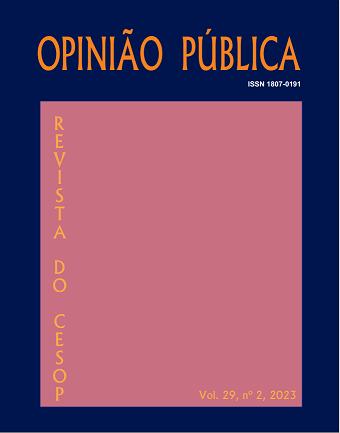Abstract
Political corruption is one of the most severe and complex problems facing new and old democracies. Fundamentally, it involves the abuse of public power for any kind of private benefit, including advantages to governing parties over their opposition. It thus defeats the principle of political equality inherent in democracy, as its protagonists can obtain or maintain power and political benefits disproportionate to what they would achieve through legitimate and forms of political competition. At the same time, it distorts the republican dimension of democracy because it makes public policies result, not from debate and public dispute between different projects, but from behind-the-scenes agreements that favor spurious interests. Despite the efficiency of classical methodological instruments such as opinion polls with structured questionnaires and qualitative research with focus groups, it is still possible to identify biases in the quality of the information collected on corruption. This article aims to address this issue by introducing two survey experiments, one conducted in 2014 and one in 2018. The 2014 survey indicated that there is a substantive difference between the direct question and the experimental question. The level of tolerance for corruption is much higher than the other methodological instruments point out. Comparison with the 2018 experiment allowed the validation and extrapolation of the results found by Moisés and Nunes de Oliveira (2018).
References
ABRANCHES, S. “Presidencialismo de coalizão: o dilema institucional brasileiro”. Revista Brasileira de Ciências Sociais, vol. 31, nº 1, p. 5-14, 1998.
BANFIELD, E. The moral basis of a backward society. Illinois: The Free Press, 1958.
BECQUART-LECLERCQ, J. “Paradoxes of Political Corruption: A French View”. In: HEIDENHEIMER, A.; JOHNSTON, M.; LEVINE, V. T. Political corruption: a handbook. Edition 2ª, New Brunswick: Transaction Publishers, 1990.
BRAITHWAITE, J. Crime, shame and reintegration. New York: Cambridge University Press, 1989.
DAHL, R. Polyarchy: participation and opposition. New Haven and London: Yale University Press, 1972.
DIAMOND, L. Developing democracy: toward consolidation. Maryland: Johns Hopkins University Press Books, 1999.
DREHER, A.; HERZFELD, T. “The economic costs of corruption: a survey and new
evidence”. Available at: <http://dx.doi.org/10.2139/ssrn.734184>. Accessed on: Aug. 15, 2023.
ETZIONI-HALEVY, E. Bureaucracy and democracy: a political dilemma. New York: Routledge & Kegan Paul Press, 1985.
HAMILTON, A.; HAMMER, C. Can we measure the power of the grabbing hand? A comparative analysis of different indicators of corruption. OKR, 2018. Available at: <https://openknowledge.worldbank.org/handle/10986/29162>. Accessed on: May, 04, 2023.
HEIDENHEIMER, A.; JOHNSTON, M.; LEVINE, V. T. Political corruption: a handbook. Edition 2ª, New Brunswick: Transaction Publishers, 1990.
HUNTINGTON, S. Political order in changing societies. New Haven: Yale University Press, 1968.
HUNTINGTON, S. The third wave: democratization in the late 20th century. Oklahoma: University of Oklahoma Press, 1993.
INGLEHART, R.; WELZEL, C. Modernization, cultural change, and democracy: the human development sequence. Boston: Cambridge University Press, 2005.
JOHNSTON, M. “The political consequences of corruption: a reassessment”. Comparative Politics, vol. 18, nº 4, 1986.
KAUFMANN, D.; KRAAY, A.; MASTRUZZI, M. The worldwide governance indicators: methodology and analytical issues. OKR, 2007. Available at: <https://openknowledge.worldbank.org/handle/10986/3913>. Accessed on: May, 04, 2023.
KLITGAARD, R. Controlling corruption. Berkeley: University of California Press, 1988.
KLITGAARD, R. “International cooperation against corruption”. Finance & Development, vol. 35, nº 1, p. 3-6, 1998.
KUNICOVÁ, J. Democratic institutions and corruption: incentives and constraints in politics. In: ROSE-ACKERMAN, S. (ed.). International handbook on the economics of corruption. Cheltenham: Edward Elgar Publishing Limited, 2006.
LAAKSO, M.; TAAGEPERA, R. “Effective number of parties: a measure with application to West Europe”. Comparative Political Studies, vol. 12, nº 1, p. 3-27, 1979.
LAMBSDORFF, J. Causes and consequences of corruption: what do we know from a cross-section of countries?. In: ROSE-ACKERMAN, S. (ed.). International handbook on the economics of corruption. Cheltenham: Edward Elgar Publishing Limited, 2006.
LIJPHART, A. Democracies: patterns of majoritarian and consensus government in twenty-one countries. New Haven: Yale University, 1984.
MAURO, P. “Corruption and the composition of government expenditure”. Journal of Public Economics, vol. 69, p. 263-279, 1998.
MENEGUELLO, R. O lugar da corrupção no mapa de referência dos brasileiros: aspectos da relação entre corrupção e democracia. In: AVRITZER, L.; FILGUEIRAS. F. Corrupção e Sistema Político no Brasil. São Paulo: Record/Civilização Brasileira, 2011.
MOISÉS, J. A. “Political corruption and democracy in contemporary Brazil”. Revista Latino-Americana de Opinión Pública, vol. 1, nº. 0. Buenos Aires: Dedalus Editores, p. 103-124, 2010.
MOISÉS, J. A. Corrupção política e democracia no Brasil contemporâneo. In: MOISÉS, J. A.; MENEGUELLO, R. (eds.). A desconfiança política e seus impactos na qualidade da democracia. São Paulo: Edusp, p. 201-236, 2013.
MOISÉS, J. A. Corrupção e democracia: os efeitos de uma sobre a outra (online). Instituto Millenium, 28 ago. 2017. Available at: <https://institutomillenium.org.br/corrupo-democracia-os-efeitos-de-uma-sobre-outra/>. Accessed on: Aug. 15, 2023.
MOISÉS, J. A.; NUNES DE OLIVEIRA, E. “A corrupção na visão da sociedade brasileira”. Trabalho apresentado no XI Encontro da Associação Brasileira de Ciência Política. Universidade Federal do Paraná, Curitiba, 2018.
PAVÃO, N. “Corruption as the only option: the limits to electoral accountability”. The Journal of Politics University of Chicago Press, vol. 80, nº 3, p. 996-1010, 2018.
RENNÓ, L. “Escândalos e voto: as eleições presidenciais brasileiras de 2006”. Opinião Pública, Campinas, vol. 13, nº 2, p. 260-282, 2007.
SELIGSON, M. “The impact of corruption on regime legitimacy: a comparative study of four Latin American countries”. Journal of Politics, vol. 64, nº 2, 2002.
SWAMY, A., et al. “Gender and corruption”. Journal of Development Economics, vol. 64, n° 1, p. 25-55, 2001.
TREISMAN, D. “What have we learned about the causes of corruption from ten years of cross-national empirical research?”. Annual Review of Political Science, vol. 10, p. 211-244, 2007.
WATERBURY, J. “Corruption, political stability and development: comparative evidence from Egypt and Morocco”. Government and Opposition, vol. 11, nº 4, 1976.

This work is licensed under a Creative Commons Attribution 4.0 International License.
Copyright (c) 2023 Opinião Pública

